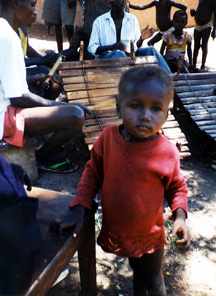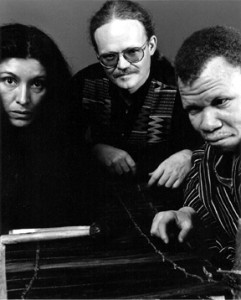The Gyil
 The Gyil (pronounced JEE-lee) is one of the grandparents of the mallet keyboard family. It is made from fourteen wooden slats that are suspended, on a frame, over calabash gourds. Its sound is like the Western marimba, yet more “earthen” in character. It is the national instrument of the Lobi and Dagara people of Ghana, Burkina Faso, and Côte D’Ivoire. Throughout West Africa, the people believe that its “woody” sound comes from a vibration of water that physically balances the water in the bodies of humans and animals.
The Gyil (pronounced JEE-lee) is one of the grandparents of the mallet keyboard family. It is made from fourteen wooden slats that are suspended, on a frame, over calabash gourds. Its sound is like the Western marimba, yet more “earthen” in character. It is the national instrument of the Lobi and Dagara people of Ghana, Burkina Faso, and Côte D’Ivoire. Throughout West Africa, the people believe that its “woody” sound comes from a vibration of water that physically balances the water in the bodies of humans and animals.
 The gyil is used for everything in life; from weddings and funerals to dances and everyday recreation. Nearly every man and boy in the community can play at least a tune or two on the gyil. Yet the qyil master (an instrument maker as well as a player) studies the instrument for much of his life before he is considered worthy to represent his community at sacred events.
The gyil is used for everything in life; from weddings and funerals to dances and everyday recreation. Nearly every man and boy in the community can play at least a tune or two on the gyil. Yet the qyil master (an instrument maker as well as a player) studies the instrument for much of his life before he is considered worthy to represent his community at sacred events.
 Like its counterpart, the western marimba, the gyil has a vast repertoire of solo and chamber music, passed in this case orally from father to son for centuries. The gyil tradition has set the tone for the “melody-improv-melody” form common in Jazz. Even youngsters who play the instrument are expected to remember complex pieces and improvise according to dance movements and singer’s directives.
Like its counterpart, the western marimba, the gyil has a vast repertoire of solo and chamber music, passed in this case orally from father to son for centuries. The gyil tradition has set the tone for the “melody-improv-melody” form common in Jazz. Even youngsters who play the instrument are expected to remember complex pieces and improvise according to dance movements and singer’s directives.
 The Mandara Music Gyil Transcription Series features some of the best-known pieces for this instrument. These are the only published transcriptions of one of man’s first and most complex solo mallet instruments.
The Mandara Music Gyil Transcription Series features some of the best-known pieces for this instrument. These are the only published transcriptions of one of man’s first and most complex solo mallet instruments.
Please visit the writings area for more information about the Gyil.
